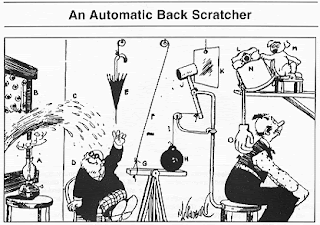
Any of you who know my jeremiads against bizarre state liquor laws will know that one question generally follows: "Who are these people who actively support these laws - spending lots of money to lobby for their preservation - and what do they want?" When I read my morning blog-papers over coffee today, I noticed this strange story about a ban on the "Boilermaker" drink in Nebraska. Ok, the back story: as if Sunday sale bans weren't dumb enough, Nebraska is considering revoking a law that bans the mixture of beer and hard liquor. And there are people who are spending time and money trying very hard to fight this. Yes. The story names one of the main groups lobbying to keep this ban in place, so I thought it would be a good time to look hard at their philosophy, goals and methods:
Project Extra Mile, which fights underage drinking, is one of several plaintiffs in a pending lawsuit that challenges the state Liquor Control Commission's decision to allow flavored alcoholic beverages, or so-called "alcopops" to be classified as beer instead of hard liquor. Flavored alcoholic beverages start out as brewed malt beverages but are flavored with distilled spirits. The plaintiffs use the current law banning the mixture of booze and beer in its lawsuit challenging the state rule that classifies the drinks as beer.
So, this Omaha chapter of "Project Extra Mile" is most interested in trying to classify Mike's Hard Lemonade as a liquor, not a beer, so that it would be taxed at a higher level (a few pennies more on each bottle). And this is because they think a few pennies extra will deter the "8th grade girls" (who they claim are the main drinkers of hard lemonade and the like) from buying the stuff and drinking it. Really. They are fighting in the courts and lobbying state officials to keep bartenders from putting a shot of whiskey into a glass of beer (not my thing, but that's a matter of taste) so that they can make 8th grade girls use a higher percentage of their allowance to pay their older siblings to get hard lemonade. Really. It's like a bizarre Rube Goldberg contraption where the chicken lays an egg, and the egg rolls down a ramp and hits a match that lights a candle, etc., until the mouse hits the alarm clock and the guy wakes up. Except their end game seems to me like the egg rolls off the table and doesn't go anywhere, because the 8th grade girls are already breaking the law to get hard lemonade; they will probably find a few extra pennies to do it. This is far easier than actually finding a way to get the alcohol. To me, this is yet another example of the crazy American attitude towards liquor politics, which has very little common sense involved and much wasted effort.
Now, if you want to try to curb underage binge-drinking, there are plenty of ways to do it. How about helping parents instill healthy attitudes towards alcohol from a young age, even letting children drink at the home (a small glass of wine mixed with some water for adolescents, like they do in many parts of the globe)? Teens who drink with their parents experience far fewer alcohol-related problems than teens whose parents follow a "total ban" of alcohol. This is different, however, from teens whose parents buy alcohol for parties that their kids throw; this does seem to lead to binge drinking. As Science Daily writes:
A previous study in 2004 by Kristie Foley of Wake Forest University Baptist Medical Center in North Carolina showed that teenagers who received alcohol from their parents for parties were up to three times more likely to binge drink within a month, while those who drank only with the family were less likely to binge. So the context in which a parent provides alcohol may be key.
So what context does Project Extra Mile want to create? This: "Underage drinking is not merely illegal and unhealthy, it's unacceptable. We change laws and policies to reduce youth access to alcohol."
Well, good luck with that mission. Oh, wait, their rebuttal to that is affixed to their web site:
"ExtraMile Motto: If you don't think it and dream it today, it will never become reality ten years from now."Or, maybe the dream of kids not touching alcohol isn't ever going to become reality, and maybe that's a good thing. At some point, like a washed-up minor league baseball player, you have to start asking yourself if the dream itself needs some retooling.
No comments:
Post a Comment